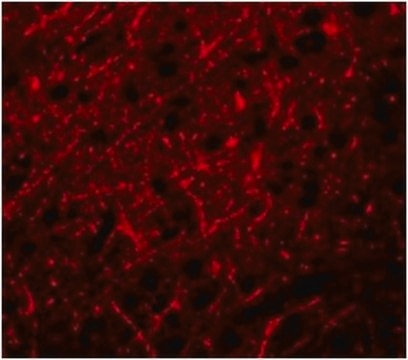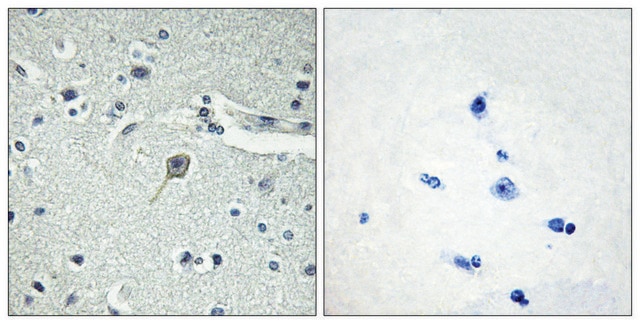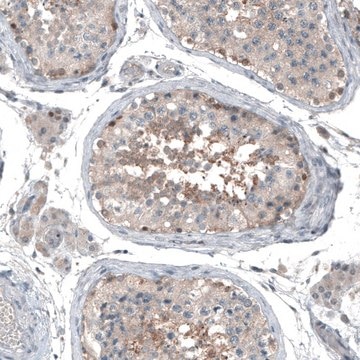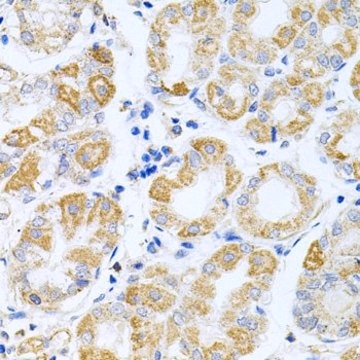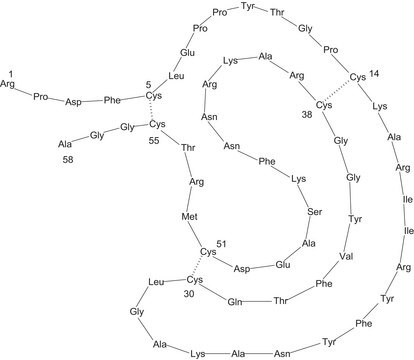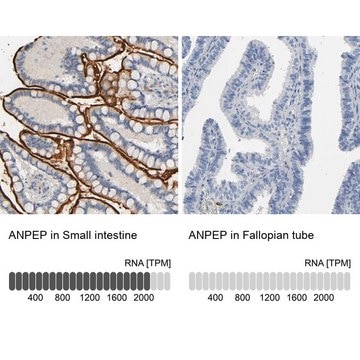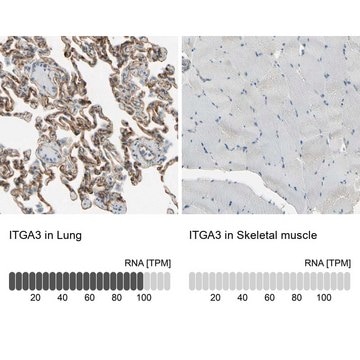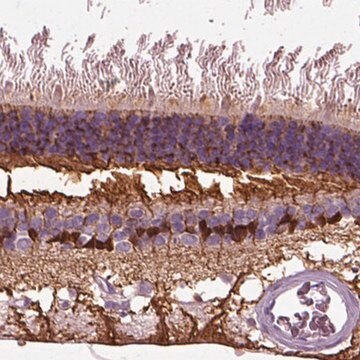AB1426
Anti-Uncoupling Protein 1 Antibody
Chemicon®, from rabbit
Synonym(s):
UCP1
Sign Into View Organizational & Contract Pricing
All Photos(1)
About This Item
UNSPSC Code:
12352203
eCl@ss:
32160702
NACRES:
NA.41
Recommended Products
biological source
rabbit
Quality Level
antibody form
purified immunoglobulin
antibody product type
primary antibodies
clone
polyclonal
species reactivity
human, rat, mouse
manufacturer/tradename
Chemicon®
technique(s)
ELISA: suitable
western blot: suitable
NCBI accession no.
UniProt accession no.
shipped in
dry ice
target post-translational modification
unmodified
Gene Information
human ... UCP1(7350)
Related Categories
Specificity
Reactive with mouse, rat, and human UCP1. Reactivity confirmed by western blot of purified UCP from brown adipose tissue. No cross-reactivity with UCP2.
Immunogen
Synthetic peptide corresponding to amino acids 145-159 of mouse UCP1. (C)SHLHGIKPRYTGTYN
Application
ELISA: 1:100,000
Western blot: 1:1,000
Optimal working dilutions must be determined by the end user.
Western blot: 1:1,000
Optimal working dilutions must be determined by the end user.
Research Category
Metabolism
Metabolism
Research Sub Category
Ion & Transport Channels
Ion & Transport Channels
This Anti-Uncoupling Protein 1 Antibody is validated for use in ELISA, WB for the detection of Uncoupling Protein 1.
Physical form
Format: Purified
Protein A-purified rabbit immunoglobulin. Liquid. Buffer = 100 mM KHPO4, 140 mM NaCl, pH 7. Contains no preservatives.
Storage and Stability
Maintain at -20 in undiluted aliquots for up to 12 months. Avoid repeated freeze/thaw cycles.
Legal Information
CHEMICON is a registered trademark of Merck KGaA, Darmstadt, Germany
Disclaimer
Unless otherwise stated in our catalog or other company documentation accompanying the product(s), our products are intended for research use only and are not to be used for any other purpose, which includes but is not limited to, unauthorized commercial uses, in vitro diagnostic uses, ex vivo or in vivo therapeutic uses or any type of consumption or application to humans or animals.
Not finding the right product?
Try our Product Selector Tool.
wgk_germany
WGK 2
flash_point_f
Not applicable
flash_point_c
Not applicable
Certificates of Analysis (COA)
Search for Certificates of Analysis (COA) by entering the products Lot/Batch Number. Lot and Batch Numbers can be found on a product’s label following the words ‘Lot’ or ‘Batch’.
Already Own This Product?
Find documentation for the products that you have recently purchased in the Document Library.
S Lauboeck et al.
Histochemistry and cell biology, 108(1), 83-91 (1997-07-01)
The distribution of S-100 protein and its alpha- and beta-subunits in bovine exocrine glands was studied by indirect immunohistochemistry. The entire spectrum of salivary glands, glands of the respiratory tract, intestinal glands, male and female genital glands, and skin glands
RIP140-targeted repression of gene expression in adipocytes.
Christian, M; Kiskinis, E; Debevec, D; Leonardsson, G; White, R; Parker, MG
Molecular and cellular biology null
Assunta Lombardi et al.
PloS one, 10(2), e0116498-e0116498 (2015-02-07)
3,5-Diiodo-l-thyronine (T2), a thyroid hormone derivative, is capable of increasing energy expenditure, as well as preventing high fat diet-induced overweight and related metabolic dysfunction. Most studies to date on T2 have been carried out on liver and skeletal muscle. Considering
Hwan Hee Lee et al.
Nature communications, 10(1), 3536-3536 (2019-08-08)
Tonicity-responsive enhancer binding protein (TonEBP or NFAT5) is a regulator of cellular adaptation to hypertonicity, macrophage activation and T-cell development. Here we report that TonEBP is an epigenetic regulator of thermogenesis and obesity. In mouse subcutaneous adipocytes, TonEBP expression increases > 50-fold
Han Fang et al.
iScience, 24(5), 102470-102470 (2021-06-12)
Dietary methionine restriction (MR) is normally implemented using diets formulated from elemental amino acids (AA) that reduce methionine content to ∼0.17%. However, translational implementation of MR with elemental AA-based diets is intractable due to poor palatability. To solve this problem
Our team of scientists has experience in all areas of research including Life Science, Material Science, Chemical Synthesis, Chromatography, Analytical and many others.
Contact Technical Service